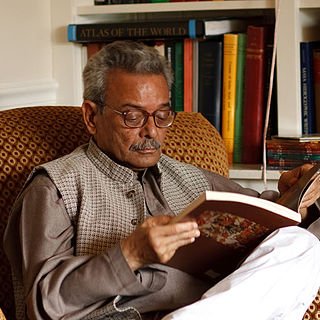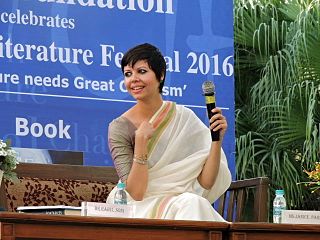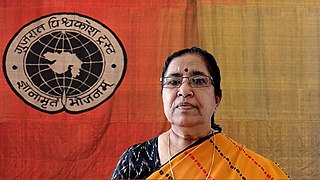
Qurratulain Hyder was an Indian Urdu novelist and short story writer, academic, and journalist. One of the most outstanding and influential literary names in Urdu literature, she is best known for her magnum opus, Aag Ka Darya, a novel first published in Urdu in 1959, from Lahore, Pakistan, that stretches from the fourth century BC to post partition of India.

The Sahitya Akademi Award is a literary honour in India, which the Sahitya Akademi, India's National Academy of Letters, annually confers on writers of the most outstanding books of literary merit published in any of the 22 languages of the 8th Schedule to the Indian constitution as well as in English and Rajasthani language.

Shamsur Rahman Faruqi was an Indian Urdu language poet, author, critic, and theorist. He is known for ushering modernism to Urdu literature. He formulated fresh models of literary appreciation that combined Western principles of literary criticism and subsequently applied them to Urdu literature after adapting them to address literary aesthetics native to Arabic, Persian, and Urdu. Some of his notable works included Sher-e-Shor Angez (1996), Ka’i Chand The Sar-e Asman (2006), The Mirror of Beauty (2013), and The Sun that Rose from the Earth (2014). He was also the editor and publisher of the Urdu literary magazine Shabkhoon.

Gopi Chand Narang was an Indian theorist, literary critic, and scholar who wrote in Urdu and English. His Urdu literary criticism incorporated a range of modern theoretical frameworks including stylistics, structuralism, post-structuralism, and Eastern poetics.

Benny Daniel, better known by his pen name Benyamin, is an Indian writer in Malayalam from Kerala. He is the author of about thirty books in various genres – from short stories to novels and memoirs. For his novel Goat Days (Aadujeevitham), he won the Abu Dhabi Sakthi Award, Kerala Sahitya Akademi Award and JCB Prize, and was shortlisted for the Man Asian Literary Prize. The novel Manthalirile 20 Communist Varshangal won the Vayalar Award in 2021.
Anuradha Roy is an Indian novelist, journalist and editor. She has written five novels: An Atlas of Impossible Longing (2008), The Folded Earth (2011), Sleeping on Jupiter (2015), All the Lives We Never Lived (2018), and The Earthspinner (2021).
Rahman Abbas is an Indian fiction writer and the recipient of the India's highest literary Award Sahitya Akademi Award for his fourth novel Rohzin in 2018. He is also the recipient of the two State Academy Awards for his third and fourth novels respectively i.e. Hide and Seek in the Shadow of God (2011) and the Rohzin in 2017. He is the only Indian novelist whose work in German has received a LitProm Grant funded by the German Federal Foreign Office and the Swiss-South Cultural Fund. He writes in Urdu and in English. His novels deal with themes of forbidden politics and love.

Janice Pariat is an Indian poet and writer. She was born in Assam and grew up in Shillong, Meghalaya.

The Gujarat Sahitya Akademi or Gujarat Sahitya Academy, established in 1981, is a government institution dedicated to the development of the languages spoken in Gujarat, India and their literature. Gujarati, an official language of Gujarat, is one of them; the others are Hindi, Sanskrit, Kutchi, Sindhi and Urdu. As of 2022, Bhagyesh Jha is the chairman of the Akademi.

S. Hareesh is an Indian writer, translator and screenwriter of Malayalam literature and cinema. He is best known for his short stories and his acclaimed but controversial debut novel, Meesa, which explores caste in Kerala in the mid-20th century. The novel, initially serialized in the Mathrubhumi weekly, was withdrawn after protests by right-wing Hindutva groups and caste-community organizations for "maligning Hindu women and temple priests". It was later published as a full novel by DC Books. Hareesh is the recipient of several honours including the Kerala Sahitya Akademi Award for Novel and the Geetha Hiranyan Endowment of the Kerala Sahitya Akademi. In November 2020, the English translation of Meesa, titled Moustache, was selected for the JCB Prize for Literature, the Indian literary award with the highest prize money.
JCB Prize for Literature is an Indian literary award established in 2018. It is awarded annually with ₹2,500,000 (US$30,000) prize to a distinguished work of fiction by an Indian writer working in English or translated fiction by an Indian writer. The winners will be announced each November with shortlists in October and longlists in September. It has been called "India's most valuable literature prize". Rana Dasgupta is the founding Literary Director of the JCB Prize. In 2020, Mita Kapur was appointed as the new Literary Director.
Ek Mamnua Muhabbat ki Kahani is the second novel by Rahman Abbas. It was first published in 2009 and was awarded Best Novel of The Year in 2011 by the Universal Society for Peace and Research (Aurangabad). The book was an immediate success in the Urdu speaking world.

Sharifa Vijaliwala is an Indian Gujarati language writer, critic, translator and editor from Surat, Gujarat, India. She is a recipient of a 2018 Sahitya Akademi Award for Vibhajanni Vyatha, a collection of critical essays in Gujarati, and has won several Gujarat Sahitya Akademi awards for her literary work.
Abul Kalam Qasmi was an Indian scholar, literary critic, and a poet of the Urdu language who served as the dean of the Faculty of Arts at the Aligarh Muslim University. He was the editor of Tehzeeb-ul-Akhlaq and authored books such as The Criticism of Poetry. He translated E. M. Forster's Aspects of the Novel into Urdu as Novel ka Fun. He was conferred with the Sahitya Akademi Award in 2009, and the Ghalib Award in 2013.

Song of the Soil is a 2019 Nepali novel by Chuden Kabimo. The novel is based on the Gorkhaland movement revolution that took place during 1980s in the northern part of West Bengal. The Nepali edition of the novel was initially published in 2019 by FinePrint Publication in Nepal and Sambodhan Publication in India.
Zindeeq is the fifth novel by Urdu novelist Rahman Abbas, the winner of the Sahitya Akademi Award for his fourth novel, Rohzin in 2018. Zindeeq was published in November 2021 by Arshia Publication, New Delhi. Rahman has received an international grant to study Nazism in Germany and find out how the politics in Pakistan and India will affect its minorities. The novel research grant was awarded by 'Crossing Borders' programme, jointly held by the Robert Bosch Foundation and the Literarisches Colloquium, Berlin as reported by LCB & TOI.
Karamat Ali Karamat (1936–2022) was an Indian Urdu poet, author, literary critic, and mathematician. Karamat is known for collecting and introducing Odisha's Urdu literature to the Urdu-speaking world. His works include Aab e Khizar (1963), Shu'aon Ki Salīb (1972), Izāfi Tanqīd (1977), Lafzon Kā Aasmān (1984), and Lafzon Kā Ākāsh (2000). Karamat received the 2004 Sahitya Akademi Translation Prize for his Urdu translation, Lafzon Kā Ākāsh.

All the Lives We Never Lived is a novel by Anuradha Roy which was published on 14 May 2018 by Hachette India. In 2022, it was awarded the Sahitya Akademi Award.
Tanuj Solanki is an Indian writer who is founder of Bombay Literary Magazine and author of Diwali in Muzaffarnagar, Neon Noon, The Machine is Learning and Manjhi’s Mayhem.











